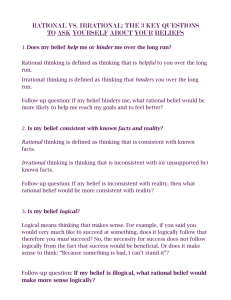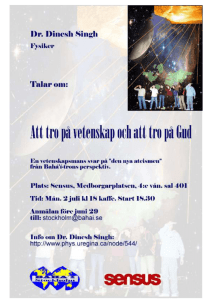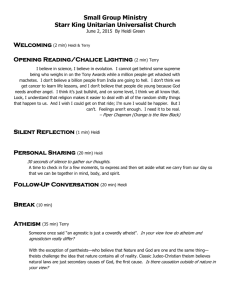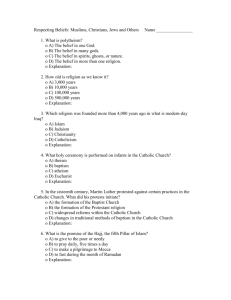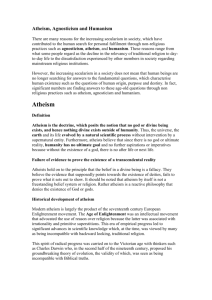Religion and Non-Religio#49
advertisement
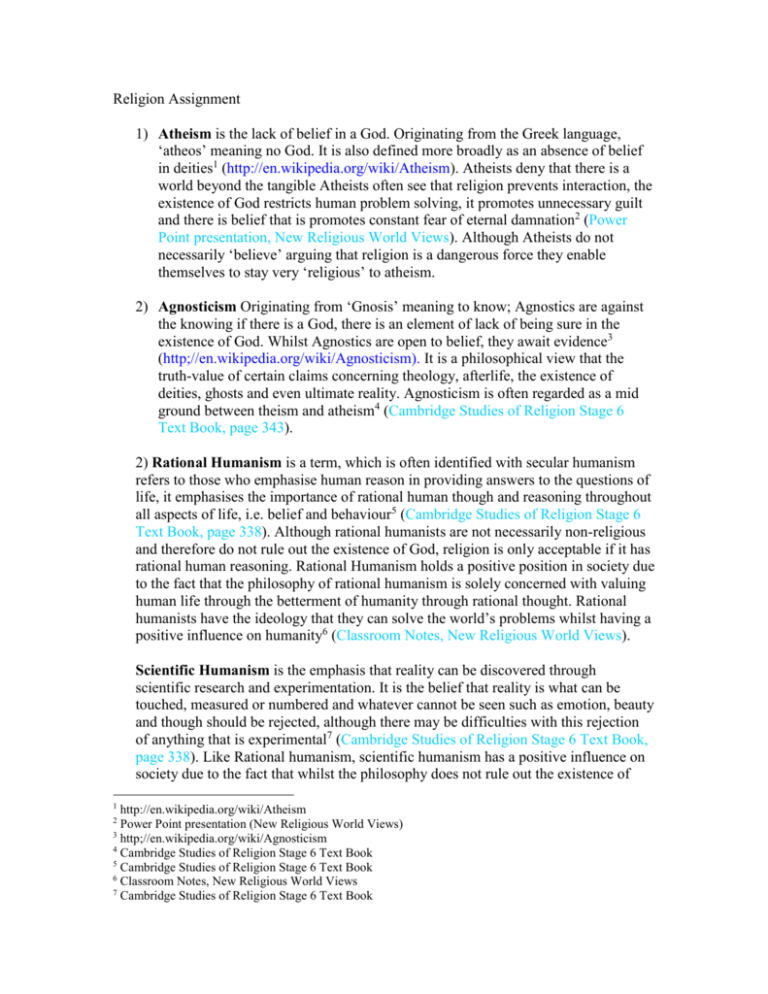
Religion Assignment 1) Atheism is the lack of belief in a God. Originating from the Greek language, ‘atheos’ meaning no God. It is also defined more broadly as an absence of belief in deities1 (http://en.wikipedia.org/wiki/Atheism). Atheists deny that there is a world beyond the tangible Atheists often see that religion prevents interaction, the existence of God restricts human problem solving, it promotes unnecessary guilt and there is belief that is promotes constant fear of eternal damnation2 (Power Point presentation, New Religious World Views). Although Atheists do not necessarily ‘believe’ arguing that religion is a dangerous force they enable themselves to stay very ‘religious’ to atheism. 2) Agnosticism Originating from ‘Gnosis’ meaning to know; Agnostics are against the knowing if there is a God, there is an element of lack of being sure in the existence of God. Whilst Agnostics are open to belief, they await evidence3 (http;//en.wikipedia.org/wiki/Agnosticism). It is a philosophical view that the truth-value of certain claims concerning theology, afterlife, the existence of deities, ghosts and even ultimate reality. Agnosticism is often regarded as a mid ground between theism and atheism4 (Cambridge Studies of Religion Stage 6 Text Book, page 343). 2) Rational Humanism is a term, which is often identified with secular humanism refers to those who emphasise human reason in providing answers to the questions of life, it emphasises the importance of rational human though and reasoning throughout all aspects of life, i.e. belief and behaviour5 (Cambridge Studies of Religion Stage 6 Text Book, page 338). Although rational humanists are not necessarily non-religious and therefore do not rule out the existence of God, religion is only acceptable if it has rational human reasoning. Rational Humanism holds a positive position in society due to the fact that the philosophy of rational humanism is solely concerned with valuing human life through the betterment of humanity through rational thought. Rational humanists have the ideology that they can solve the world’s problems whilst having a positive influence on humanity6 (Classroom Notes, New Religious World Views). Scientific Humanism is the emphasis that reality can be discovered through scientific research and experimentation. It is the belief that reality is what can be touched, measured or numbered and whatever cannot be seen such as emotion, beauty and though should be rejected, although there may be difficulties with this rejection of anything that is experimental7 (Cambridge Studies of Religion Stage 6 Text Book, page 338). Like Rational humanism, scientific humanism has a positive influence on society due to the fact that whilst the philosophy does not rule out the existence of 1 http://en.wikipedia.org/wiki/Atheism Power Point presentation (New Religious World Views) 3 http;//en.wikipedia.org/wiki/Agnosticism 4 Cambridge Studies of Religion Stage 6 Text Book 5 Cambridge Studies of Religion Stage 6 Text Book 6 Classroom Notes, New Religious World Views 7 Cambridge Studies of Religion Stage 6 Text Book 2 God what can be proven is seen to be real thus there would be no science without religion and there would be no religion without science8 (Classroom Notes, New Religious World Views). 3) 8 Name Characteristics Agnosticism Atheism Humanism - Believe it is impossible to know weather God exists or not - Generally open to belief although they await evidence - Lack of belief in God and deities - They deny a world beyond the tangible - Reject traditional religion and its purpose - No religious text (no story) - Value human life - No belief in God - Betterment of humanity through rational thought - Believe they can solve the worlds problems - It is a philosophy Aspirations (what are there aspirations) Agnostics aspire to generally be open minded thus if the existence of God could be proven through research, fact and significant evidence there views will change. Atheists aspire to reject traditional religion and its values as well as the belief in God. Atheists do however strive to fulfil human aspirations due to the fact the lack of belief in God does not hold any restrictions. Impact or influence on behaviour. In the Cambridge Studies of Religion Stage 6 Text Book suggests that agnostics behave in accordance with their personal goals and morals due to the fact that they don’t conduct them selves in a manner relevant to the belief in religion. I.e. TH Huxley believed that his knowledge and behaviour was in accordance to scientific progress of his time, thus he became Agnostic stating that being unsure of the existence of God doesn’t influence moral behaviour. In the YouTube clip (http://technorati.com/videos/ youtube.com %2Fwatch% 3FV%3D6L3 ijqyqVWs) suggest that Atheism’s impact on behaviour is nor negative or positive due to the fact that they are not restricted to conduct themselves in a different way because of their lack of belief in God, and therefore carry out a normal human life in which they fulfil their aspirations. Humanism is a philosophy that affirms the dignity and worth of all people based on the ability to determine right and wrong, in saying this Humanists aspire to focus on people thus supporting the human race whilst trying to solve the world’s problems. In the readings from CD Rom text suggest that Humanists have a positive influence on behaviour due to the fact that they believe they can solve the world’s problems whilst maintaining the betterment of society. Eg, Fred Hollows who was a famous Humanist assisted in this philosophy by helping blind Aboriginal Children Classroom Notes, New Religious World Views 4) The place of the religious dimension in history provides three key elements in which an individual may adhere to these are, meaning and purpose, social cohesion and social transformation. Meaning and purpose constitutes philosophical questions concerning the purpose and significance of human existence, it is more broadly characterised by the key religious questions, the most significant of these questions relate to the origin (where did we come from?), purpose (why are we here?) and destiny (what happens to us when we die?). In relation to the three key questions the answers to them are provided through religion and due to the fact that understanding gives meaning as well as coherence to aspects of life. Religion has various roles in which it has to fulfil, the most significant of these roles however is to provide life with meaning as well as a sense of overall consistency and direction in a world which is always changing. In times of need religion often enables individuals to be uplifted as it provides life itself with a purpose and framework. Religion can also reinforce the cultural identity of a group, which is essential especially when a group consists of small ethic minorities, or individuals who have been socially separated by mainstream society9 (Religion and Non-Religion Summary Notes 2 Unit). Social cohesion is a term used in social policy to describe the bonds within a society which brings people together especially in the context of cultural diversity. Social Cohesion is an important factor due to the fact that it has a very conservative influence on society 10 (Cambridge Studies of Religion Stage 6 Text Book, Page 325). Religion also has an important role in affirming traditional beliefs and practices, it provides communities with a sense of continuity due to the fact that it intends to maintain order as well as to link the rapidly changing modern society with a more traditional stable foundation. Social Cohesion can be demonstrated through community celebrations for eg, Christian Christmas. Cohesion can often be demonstrated in attempts to use religion to stop people from breaking away from society, thus the condemnation of new religious movements. A force of social cohesion is that religion can be manipulated in a way as to legitimise values and institutions, which may result in being unjust, eg, slavery. Whilst religion is a force of social cohesion it can also serve as a force of social transformation. Social transformation is the process whereby an individual alters the socially described social status, which there parents have established and try to achieve a status for them. Religion can be utilised as a tool for criticising structures, customs and beliefs of its own societies, thus religion being the main conservative system, which upholds traditions. The central message of all major religious traditions is the importance of working towards a just and peaceful society11 (Religion and Non-Religion Summary Notes 2 Unit). 9 Religion and Non-Religion Summary Notes 2 Unit Cambridge Studies of Religion Stage 6 Text Book 11 Religion and Non-Religion Summary Notes 2 Unit 10
